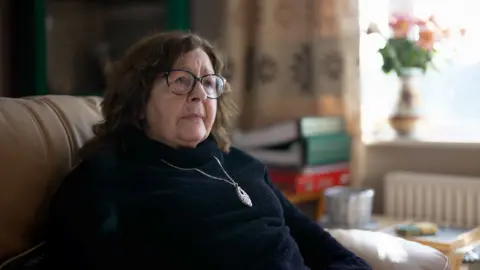Health Correspondent
 Getty Images
Getty ImagesA law to give terminally ill adults on the Isle of Man the right to end their own lives is entering its final stages, making it potentially the first jurisdiction in the British Isles to legalise assisted dying.
Anyone over the age of 18 and with a prognosis of 12 months or fewer to live would be eligible, under the legislation being debated in the Manx parliament.
Agreement is still needed on whether to cut the residency criteria from five years to 12 months before being able to access the scheme.
The move comes as MPs in Westminster are scrutinising a bill that would legalise assisted dying in England and Wales. A separate bill is under discussion in Scotland.
People on the Isle of Man eligible to request assisted dying would have to:
- Be terminally ill and “reasonably expected” to die within 12 months
- Be over the age of 18
- Be registered with an Isle of Man GP
- Have the legal capacity to make the decision
- Have the decision verified by two independent doctors
The measures have been a matter of strong debate in the island’s Tynwald parliament.
One remaining sticking point is how long you need to live there before having the right to request an assisted death.
The original legislation stipulated five years, with a more recent proposal cutting that time to 12 months.
That amendment is likely to be rejected, while some other changes to the wording in the bill will be approved.
If all those changes are accepted, it is likely the bill will receive Royal Assent and become law, with the scheme possibly up and running by 2027.
Jersey – a self-governing territory like the Isle of Man which can make its own laws – is also moving ahead with legislation to establish an assisted dying service.
‘A long and careful process’
Former GP Dr Alex Allinson introduced the private members bill to Tynwald and has been pivotal in ushering it through the legislative process.
He hopes this will be the last time it will need to be debated by the directly elected chamber.
“The passage of this bill has been a long and careful process starting in 2022 and has been properly consulted on, scrutinised and put through a full parliamentary process,” Dr Allinson says.
“It lays the basis for further work to implement a service on the Island for those facing a terminal illness who would like more autonomy and dignity at the time of their death.”
Among the key clauses in the most recent version of the bill are measures on age and length of prognosis.
 Getty Images
Getty ImagesHow does the Isle of Man legislation differ from the Westminster bill?
The Terminally Ill Adults (End of Life) Bill, introduced by backbench Labour MP Kim Leadbeater, is currently being scrutinised by MPs in Westminster.
If passed it would become law in England and Wales.
It has some similarities to the Isle of Man legislation – people must be terminally ill, over 18 and registered with a GP.
Both bills spell out the need for patients to have the mental capacity to make the choice and be deemed to have expressed a clear, settled and informed wish, free from coercion or pressure.
The Isle of Man bill says people would be expected to have fewer than 12 months to live, but the Leadbeater bill has adopted a more conservative six months.
The Manx legislation is also likely to require five years of residency on the island, to try to stop people going there to take advantage of the scheme, as people do by travelling to Switzerland’s Dignitas clinic.
On the Isle of Man, two independent doctors will need to agree the request for assisted dying, but Leadbeater has recently suggested that cases in England and Wales could be approved by a panel of experts rather than a single judge, as was originally proposed.
That change has proved controversial, but is one of about 300 amendments being considered by a cross-party committee of MPs.
Meanwhile, the legislation being proposed in Jersey has very similar restrictions to the Westminster plans. However, it has a proposal that would extend the right to die for terminally ill adults with six months or fewer left to live to 12 months for people with neurodegenerative conditions
As with the Westminster legislation, the Isle of Man has experienced some passionate campaigning both for and against the proposed new law.
A third of doctors who responded to an Isle of Man Medical Society survey in 2023 said they would consider leaving if the legislation was introduced.

Some doctors fear the legislation will be a “slippery slope” that will see the scope of the laws extended.
Isle of Man GP Dr Martin Rankin is a member of the Medical Society and is worried about the dangers of coercion, where vulnerable people are pressured to end their lives early.
“The safeguards that are in place on this one, I’m not going to know if somebody has been coerced by a relative into ending their life sooner than they wish.
“So I really won’t be getting involved in it.”

However, there have been some passionate campaigners who have spent years fighting for this legislation.
Millie Blenkinsop-French lost her son James to neck cancer, aged only 52.
It was a very difficult, painful death that cemented her belief in assisted dying for the terminally ill.
“Nobody in their right mind would be against assisted dying if they had to sit, like I did, and watch my son die.
“I wish with all my heart and soul that assisted dying had been in then, I really do, because he would have opted for it. He wasn’t a stupid boy, he was a very intelligent young man.
“And it’ll give an awful lot of people the chance that James didn’t have, give an awful lot of people the chance to say, you know, ‘enough is enough, let me pass over’.”
The Isle of Man legislation now looks set to become law, but as politicians in Jersey, Westminster and Holyrood also consider their own proposals, the wider debate about assisted dying is far from over.

















Leave a Reply